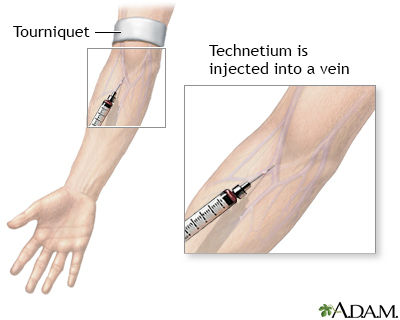Definition
A liver scan uses a radioactive material to check how well the liver or spleen is working and to assess masses in the liver.
Alternative Names
Technetium scan; Liver technetium sulfur colloid scan; Liver-spleen radionuclide scan; Nuclear scan - technetium; Nuclear scan - liver or spleen
How the Test is Performed
The health care provider will inject a radioactive material called a radioisotope into one of your veins. After the liver has soaked up the material, you will be asked to lie on a table under the scanner.
The scanner can tell where the radioactive material has gathered in the body. Images are displayed on a computer. You may be asked to remain still, or to change positions during the scan.
How to Prepare for the Test
You will be asked to sign a consent form. You will be asked to remove jewelry, dentures, and other metals that can affect the scanner's functions.
You may need to wear a hospital gown.
How the Test will Feel
You will feel a sharp prick when the needle is inserted into your vein. You should not feel anything during the actual scan. If you have problems lying still or are very anxious, you may be given a mild medicine (sedative) to help you relax.
Why the Test is Performed
The test can provide information about liver and spleen function. It is also used to help confirm other test results.
The most common use for a liver scan is to diagnose a condition called benign focal nodular hyperplasia, or FNH, which causes a non-cancerous mass in the liver.
Normal Results
The liver and spleen should look normal in size, shape, and location. The radioisotope is absorbed evenly.
What Abnormal Results Mean
Abnormal results may indicate:
Risks
Radiation from any scan is always a slight concern. The level of radiation in this procedure is less than that of most x-rays. It is not considered to be enough to cause harm to the average person.
Pregnant or nursing women should consult their provider before any exposure to radiation.
Considerations
Other tests may be needed to confirm the findings of this test. These may include:
This test is used infrequently. Instead, MRI or CT scans are more often used to evaluate the liver and spleen.
References
Chernecky CC, Berger BJ. Hepatobiliary scan (HIDA scan) - diagnostic. In: Chernecky CC, Berger BJ, eds. Laboratory Tests and Diagnostic Procedures. 6th ed. Philadelphia, PA: Elsevier Saunders; 2013:635-636.
Mettler FA, Guiberteau MJ. Gastrointestinal tract. In: Mettler FA, Guiberteau MJ, eds. Essentials of Nuclear Medicine and Molecular Imaging. 7th ed. Philadelphia, PA: Elsevier; 2019:chap 7.
Narayanan S, Abdalla WAK, Tadros S. Fundamentals of pediatric radiology. In: Zitelli BJ, McIntire SC, Nowalk AJ, eds. Zitelli and Davis' Atlas of Pediatric Physical Diagnosis. 7th ed. Philadelphia, PA: Elsevier; 2018:chap 25.
Tirkes T, Sandrasegaran K. Investigative imaging of the liver. In: Saxena R, ed. Practical Hepatic Pathology: A Diagnostic Approach. 2nd ed. Philadelphia, PA: Elsevier; 2018:chap 4.
